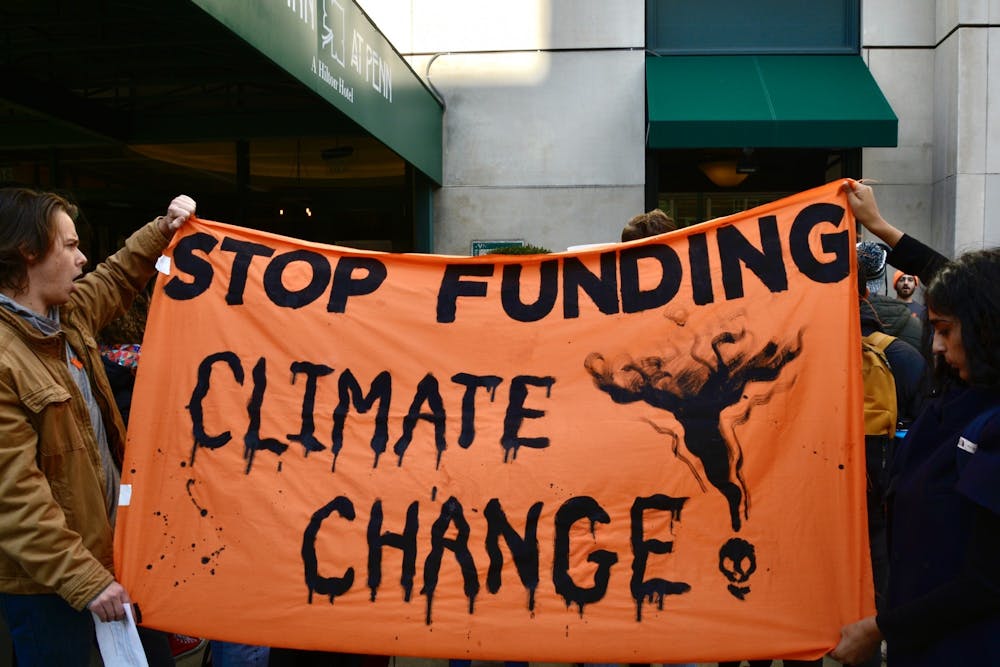A top Penn administrator criticized Fossil Free Penn's alleged unwillingness to consider ways for the University to address the climate crisis other than divestment at a climate seminar on Wednesday afternoon.
The seminar took place just hours after Penn announced its new plan to reach net-zero greenhouse gas emissions from endowment investments by 2050. Administrators explained the reasoning behind the plan, which they said would encourage businesses to make climate-friendly decisions — but environmental student groups criticized it for its long timeline and for refusing to fully divest from the fossil fuel industry.
During a section on student input and administrative transparency, Executive Vice President Craig Carnaroli criticized FFP's efforts to communicate with administration, saying that he previously spoke with two Penn graduates and former FFP members who told him that FFP is concerned with divestment, not other methods of achieving sustainability.
“It’s hard to engage with students who say, ‘This is the only thing I care about. If you don’t do what I want, then we don’t want to talk to you,’” Carnaroli said. “Dialogue is a two-way street. Student groups who want to talk to us also have to be willing to listen.”
FFP leaders rejected Carnaroli's characterization that the group is focused only on divestment. College and Engineering junior and FFP coordinator Emma Glasser said in an interview with The Daily Pennsylvanian following the event that the main goal of FFP is climate justice, a goal for which divestment is a tactic.
“We're fighting for climate justice in Philadelphia, and it just seems like Penn doesn't want that, and so that's why they won't talk to us,” Glasser said.

Glasser said that when FFP submitted a proposal in 2018 calling on Penn to divest from fossil fuels, administrators ignored the group's requests to meet with them to discuss the proposal.
RELATED:
Local policymakers and Penn alumni discuss progressive policy change at virtual event
UA secures climate town hall meeting with Penn admin. over a year after initial demands
The criticism of FFP came amid a series of questions about how administrators plan to include student input going forward. Vice President for Facilities and Real Estate Services Anne Papageorge said in response to these questions that that her office is willing to meet with any student group that reaches out about climate policies.
College junior and Student Sustainability Association at Penn Co-Chair Vyshnavi Kosigi said, however, that administrators — including Papageorge — have repeatedly ignored SSAP's requests for meetings about divestment and sustainability.
The details of Penn's Wednesday afternoon announcement were also scrutinized at the seminar. Professor of Operations, Information, and Decisions and former Faculty Senate Chair Steven Kimbrough asked administrators to explain what the plan will change in terms of how the University decides its investments.
In response, Chief Investment Officer Peter Ammon said the goal of net-zero emissions by 2050 will still help the University think more critically about its investments, even though the University does not plan to completely divest.
Ammon told Penn Today that the net-zero approach allows Penn to influence the companies in which it invests, while divestment would mean Penn's voice is not a part of the company's conversations around climate policy and clean energy.
Kimbrough also said that as many companies, including some that Penn invests in, move toward net-zero emissions themselves, the plan may be passive on the University’s part because the companies, not Penn, make the decision to reduce emissions.
Kosigi, who attended the meeting, said that while SSAP is glad to see the University listening to student concerns about the endowment’s environmental impact, the plan is “very far from ambitious.”
She added that the University’s goal for net-zero emissions by 2050 puts it on the same timeline as BP, an oil company. She said that this means the plan does not constitute a real step forward by Penn, as it continues to align with the fossil fuel industry.
“Having the same timeline as big oil is just not an act of leadership. It's not something [SSAP is] going to applaud,” Kosigi said.
FFP leaders also criticized the plan for its lengthy timeline, noting that the plan relies on the industries themselves to become carbon neutral, rather than applying financial pressure through divestment.
“Penn's plan is to sit back and hope that the world will become a better place, but that's not going to happen,” Glasser said. “With them just sitting back, they’re committing to twiddling their thumbs while the world burns.”
The difference between divestment and net-zero emissions, Engineering junior and FFP coordinator Ari Bortman said, is that divestment would create financial consequences for the harm the fossil fuel industry causes to human life.
Bortman added that a net-zero emissions goal allows the University to continue to invest in fossil fuel companies while reaching neutrality through carbon offsets.
Glasser added that by maintaining investments in the fossil fuel industry, Penn is supporting the human costs of fossil fuels, including the destruction of Indigenous land, disease, and death.
“Nobody should feel any safer about our future after today,” she said.









